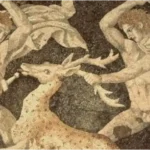
How the Macedonian Economy Fueled an Empire
The spectacular conquests of Philip II and Alexander the Great were not just the result of military genius; they were built on a powerful economic foundation.
Exploring past events, civilizations, and historical figures that shaped our world.

The spectacular conquests of Philip II and Alexander the Great were not just the result of military genius; they were built on a powerful economic foundation.

After the death of Alexander the Great, his vast empire quickly fragmented as his generals, the Diadochi, fought for control.

The conquests of Alexander the Great did more than just create a massive empire; they initiated a new era in history known as the Hellenistic period.

To truly understand the society that produced Philip II and Alexander the Great, we must look beyond their battles and politics.

For over a century and a half, the Macedonian kingdom was the dominant power in the Hellenistic world.

Before the reign of Philip II, the Macedonian army was a relatively unremarkable, semi-feudal levy.

The story of the Macedonian empire is the story of two men: a brilliant father who built a revolutionary military and political machine, and a genius son who used it to conquer the world.

In the fiercely patriarchal and militaristic world of ancient Macedonia, it is easy to overlook the influence of the women of the royal court.

While often viewed through the lens of their military conquests, the ancient Macedonians had a rich and vibrant spiritual life.

One of the most enduring and contentious questions in ancient history is the matter of identity: were the ancient Macedonians Greek?

Unlike the famous democracies and oligarchies of southern Greece, the Macedonian state was a powerful and effective monarchy.

While written histories provide the narrative of ancient Macedonia, they are often biased and incomplete.

For centuries, our understanding of ancient Macedonia was limited to the often-biased accounts of Greek and Roman historians.

To understand the rise of the Macedonian kingdom, one must first understand the land itself.

Understanding ancient Macedonia requires a deep dive into the words of those who wrote about it, but this is a complex task.